The 14th annual Undergraduate School on Experimental Quantum Information Processing (USEQIP) was in full swing over the last two weeks at the Institute for Quantum Computing (IQC). This outreach program invites undergraduate students from around the world to IQC for a deep dive into quantum information. Students learn an introduction to quantum theory, explore experimental approaches to quantum devices, and have the opportunity for hands-on exploration over nine different experiments.
This summer, IQC has welcomed 32 students from across Canada, the United States of America and India to explore the world of quantum information from May 29 to June 9. Of these students, 85 per cent are staying in Waterloo for the remainder of the summer with research awards to work with IQC faculty members.
“It's been wonderful to see this level of excitement and passion from the students for quantum science,” says Dr. John Donohue, Senior Manager, Scientific Outreach at IQC. “The hands-on experiences in USEQIP are hard to find elsewhere, and the students have done a fantastic job translating quantum information theory to real physical devices.”
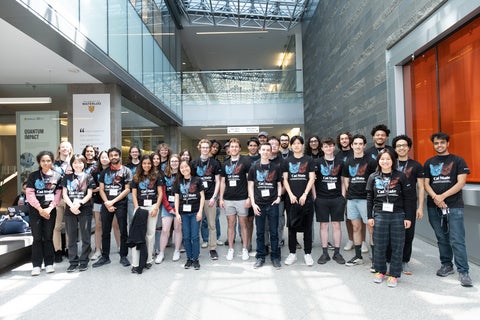
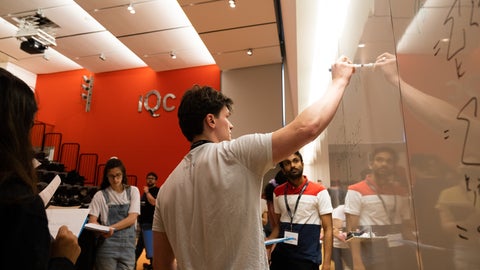
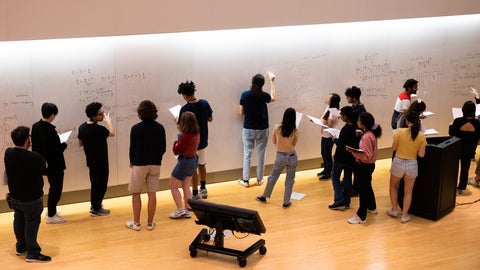

The students learned about a wide variety of quantum applications in presentations from faculty members and IQC graduate students. Highlights from this year’s program included graduate student presentations on neutrons from PhD student Melissa Henderson, and quantum error correction from MMath student Sarah Meng Li.
“I was previously a USEQIP student, and it expanded my horizons and allowed me to grow,” said Li. “Now as an IQC student, being able to come back and share what I’ve learned from my research is very rewarding. It tells me that I have learned and grew as a person, and I’m now giving back to my community. That’s very empowering.”
Students also participated in over 30 hours of experimental work over the two weeks, including experiments using nuclear magnetic resonance, superconductivity, quantum entanglement, and quantum key distribution, and also had a chance to enter the Quantum-Nano Fabrication and Characterization Facility’s cleanroom environment. Many of these labs and presentations took place in the Quantum Exploration Space, a state-of-the-art lab space used to give students and IQC visitors access to real, research-grade quantum systems for laboratory experiments and knowledge building.
While the students were here to learn and engage in quantum information, a large part of what makes IQC a great atmosphere to be part of is our community building. USEQIP students were challenged to a game of ball hockey with IQC faculty members, students and staff; were encouraged to participate in bowling and pub nights; and had the option to take a bus trip to Niagara Falls.
The USEQIP program is supported by both IQC and Transformative Quantum Technologies (TQT). Over the past 14 years, USEQIP has reached participants from 32 countries.
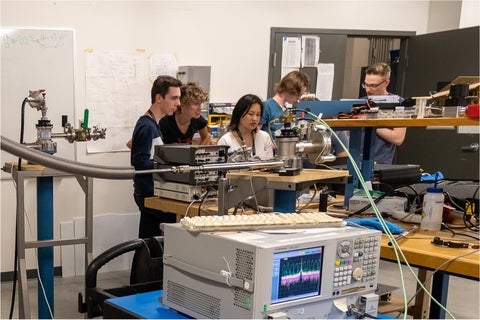

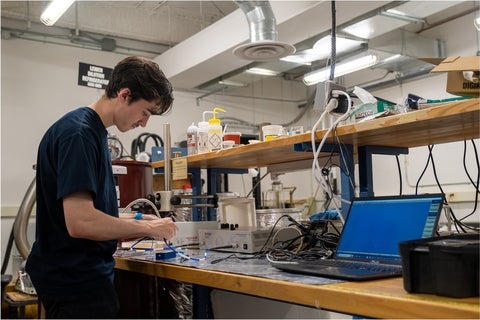
See what our students are saying about quantum and USEQIP:
Pendant deux semaines, la 14e édition du programme de formation de l’École de premier cycle sur le traitement quantique expérimental de l’information (USEQIP) a battu son plein à l’Institut d’informatique quantique (IQC). Ce programme de sensibilisation accueille des étudiants de premier cycle de partout dans le monde à l’IQC pour explorer en détail l’information quantique. Les participants et participantes suivent des cours d’introduction à la théorie quantique, explorent différentes approches expérimentales employées dans les dispositifs quantiques, et peuvent faire neuf expériences pratiques.
Cet été, l’IQC a accueilli 32 personnes du Canada, des États-Unis et de l’Inde, afin de leur permettre d’explorer le monde de l’informatique quantique du 29 mai au 9 juin. Parmi eux, 85 % resteront à Waterloo jusqu’à la fin de l’été grâce à une bourse de recherche pour travailler avec des membres du corps professoral de l’IQC.
Pour John Donohue, gestionnaire principal de la vulgarisation scientifique à l’IQC, « c’était vraiment formidable de voir les étudiants aussi excités et enthousiasmés par les sciences quantiques. Les expériences pratiques de l’USEQIP sont uniques en leur genre. Les participants ont merveilleusement bien appliqué la théorie de l’informatique quantique aux vraies machines. »




Des membres du corps professoral et des étudiants de 3e cycle de l’IQC ont donné des présentations sur une grande diversité d’applications de la quantique. Parmi les meilleurs moments du programme de cette année, on compte la présentation sur les neutrons de Melissa Henderson, étudiante au doctorat, et l’exposé sur la correction d’erreurs quantiques de Sarah Meng Li, étudiante à la maîtrise en mathématiques.
« J’ai déjà été étudiante à l’USEQIP, et ça a élargi mes horizons et m’a permis d’évoluer », affirme-t-elle. « Y revenir aujourd’hui en tant qu’étudiante de l’IQC et partager ce que mes recherches m’ont appris est très gratifiant. Ça me prouve que j’ai évolué et grandi sur le plan personnel, et me permet de redonner à ma communauté. C’est très stimulant. »
Les étudiants ont aussi participé à plus de 30 heures de travaux expérimentaux pendant les deux semaines du programme. Ils ont notamment planché sur la résonance magnétique nucléaire, la supraconductivité, l’intrication quantique et la distribution quantique de clés. Ils ont également eu la chance de pénétrer dans la salle blanche de l’Installation de fabrication et caractérisation nanométriques quantiques. Plusieurs de ces laboratoires et présentations se déroulaient dans l’Espace d’exploration quantique, un laboratoire à la fine pointe de la technologie conçu pour que les étudiants et visiteurs de l’IQC puissent avoir accès à de vrais systèmes quantiques propres à la recherche pour mener des expériences et cultiver leurs connaissances.
Bien que les participants soient venus pour se familiariser avec l’information quantique, la clé de la bonne atmosphère qui règne à l’IQC, c’est son intégration à la communauté. Les étudiants de l’USEQIP ont affronté les professeurs de l’IQC dans une partie de hockey-balle, et étudiants et membres du personnel ont pu participer à des soirées aux quilles et au pub, et même faire une excursion aux chutes Niagara en autobus.
Le programme de l’USEQIP est financé par l’IQC et l’initiative Transformative Quantum Technologies (TQT). Au cours des 14 dernières années, des personnes de 32 pays ont participé au programme.


